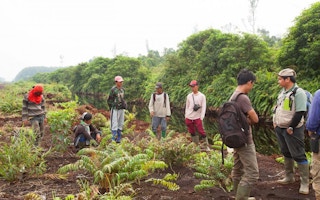Asia Pulp & Paper (APP) appears to have enough plantation fiber to operate existing mills as well as supply a new mill under construction in South Sumatra without having to pulp natural forests, argues a new report that also finds the forestry giant is successfully improving yields to support its zero deforestation commitment.
The report, published by long-time APP adversary Greenomics-Indonesia, is based on yield analysis of APP’s wood-pulp plantations and projected demand for fiber from its three large mills in Sumatra. However the report indicates that APP will not have enough fiber to operate all the mills at full capacity by 2020.
Still the results may offer comfort to environmentalists who feared that APP could backtrack on its 2013 forest conservation policy, which commits it to zero deforestation throughout its supply chain.
“
The risk of social conflict represents a major challenge that will need to be seriously considered by APP
Greenomics notes that APP appears to be improving yields on existing plantations, helping it expand pulp production without clearing new areas.
“Overall, if viewed in terms of the level of plantation fiber supply from the APP concessions in Riau, Jambi, South Sumatra and West Kalimantan, there has been a significant improvement in performance,” states the report.
“This shows that APP’s zero deforestation policy has encouraged an improved performance in the supply of plantation fiber to APP’s existing mills.”
The findings were welcomed by Aida Greenbury, Managing Director of Sustainability at APP.
“We welcome this new report from Greenomics Indonesia and will review its findings in detail,” she told mongabay.com. “Any relevant points will be considered and where applicable incorporated into our ongoing program of work to implement APP’s Forest Conservation Policy and our Zero Deforestation commitment, especially on our Growth & Yield improvement program.”
However Greenomics cautioned that gains in productivity could be slowed should social conflict arise.
“Currently, rotational harvesting and planting – in the case of acacia plantations, for example – is a key issue in determining the sustainability of a pulpwood plantation concession, given the increasing level of social conflict related to such concessions,” explains the report.
“For example, after an acacia plantation has been harvested, replanting may not proceed smoothly as it may be hampered by land claim disputes. Many cases have occurred where, after the harvesting of acacia has been completed, a tussle for control of the land with ‘local farmers’ or squatters occurs, where the company pulpwood plantation company) plants acacia as part of the rotation process, while the ‘local farmers’ or squatters plant oil palms.”
“The risk of social conflict represents a major challenge that will need to be seriously considered by APP,” Greenomics continued. “If the rotation of harvesting and planting in its pulpwood plantations is disrupted by social conflict, this will clearly affect the continuity of plantation fiber supply over the medium and long term, to the detriment of both APP’s existing and new mills.”
APP, which has already experienced such conflicts in several of its concessions, including one that was burned by locals to establish oil palm plantations within the acacia area, acknowledged the concern.
“Conflicts do occur after plantation harvest in some areas in Riau (such as the Sorek area),” said Greenbury.
“We have a clear Conflict Resolution strategy to deal with this (available on our dashboard). But when dealing with land speculators or other legal issues, we liaise with the government, and it is important for the government to enforce the law.”
APP’s forest conservation policy — developed in coordination with The Forest Trust, an international NGO — came after years of criticism from environmental groups over its forestry practices.
In less than two years, the company has moved from an environmental pariah to an example held up by traditional critics like Greenpeace as a potential model for greener development in Indonesia.
Activists are now pushing APP’s biggest competitors — Asia Pacific Resources International Limited (APRIL) and Toba Pulp Lestari (TPL), which continue to destroy natural forests — to adopt similar zero deforestation policies.
APP’s shift couldn’t have come too soon for Sumatra’s endangered forests. The pulp and paper sector has been one of the largest drivers of deforestation in Sumatra over the past twenty years, accounting for roughly a quarter of forest loss on the island during that time.

















